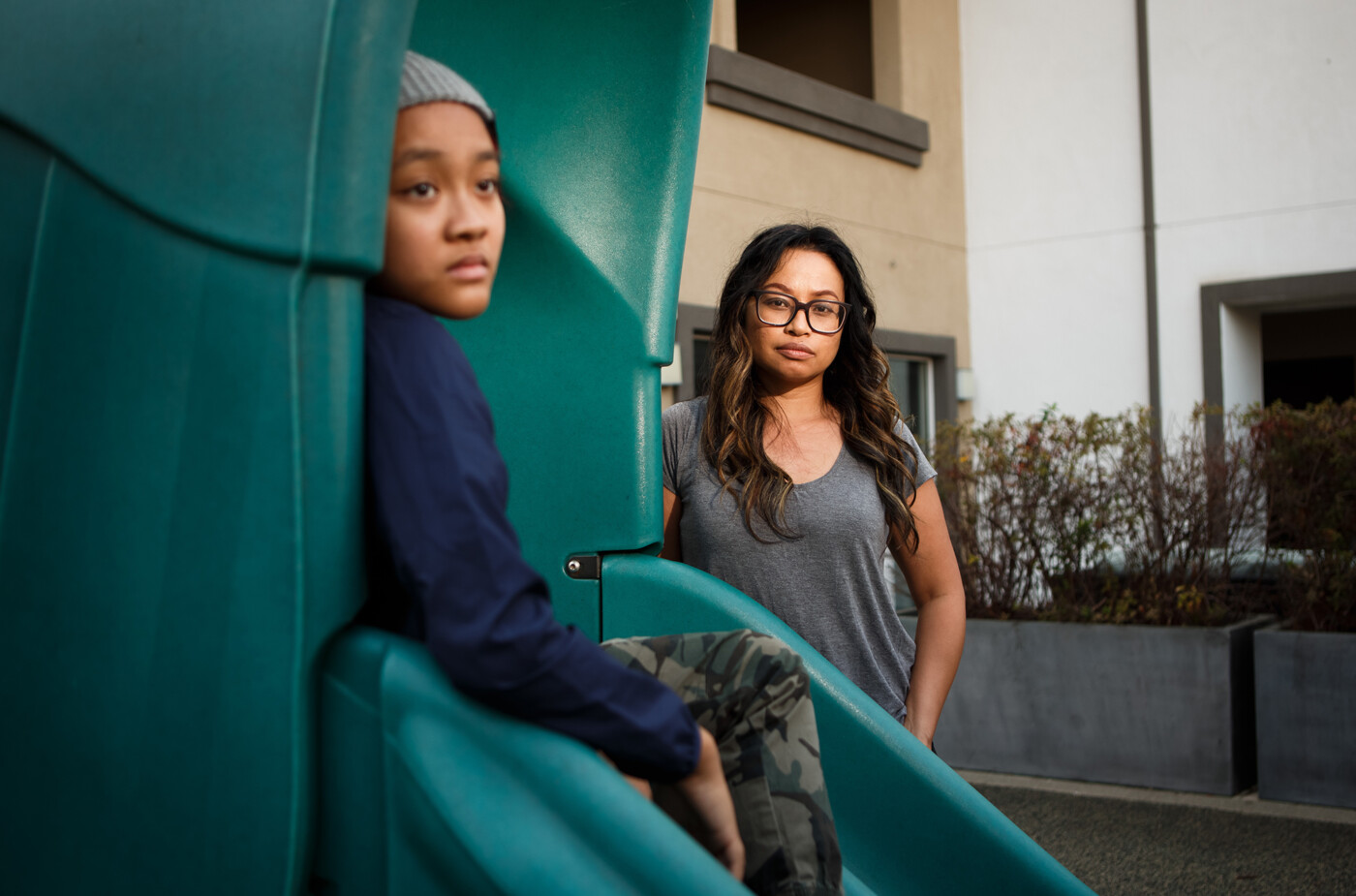As president of a San Mateo County school board, Maybelle Manio had the privilege of delivering some lighthearted remarks at her son Jake Cruz’s 8th grade graduation.
“Today is a celebration. Today is an accomplishment,” she said during the ceremony earlier this year. “Today is a good day to ask for some money.”
The crowd laughed.
When Manio returned home, she found a white piece of paper labeled “Eviction Notice” tacked to her door. She had 15 days to leave her Daly City apartment. Manio, who had recently started a new career in commercial real estate, an industry devastated by the pandemic, recognized the irony of what she had told the audience. Suddenly, she was staring at her own financial abyss.
While the economic fallout from the COVID-19 pandemic devastated low-income families, middle-class households were not immune. Manio was one of many who turned to the government and friends and family for assistance for the first time in their lives, seeking help wherever she could.
Samaritan House, a San Mateo charity offering food, rental assistance and counseling services, saw food distribution lines double, while rental assistance applications jumped five-fold. Manio was among those who got rental assistance.
“There were an awful lot of middle-class and lower middle-class folks,” said Bart Charlow, CEO of Samaritan House. Some “apologized as if it was their fault,” he said. Others avoided eye contact. More than a few broke into tears. Many experienced “complete bewilderment and loss of pride in suddenly not being able to be independent.”
The pandemic caps 40 years of a middle class squeeze in California, where the income of the state’s top earners has far outpaced that of the middle class, according to a 2020 report from the Public Policy Institute of California. The Golden State’s billionaires added $551.2 billion to their net worth, while more than 25 million Californians filed unemployment claims since March 1, 2020.
When the state shut down last spring, Manio was inundated with phone calls as clients cut and ran. It was Manio’s first year in commercial realty, and she had no clue what to do. She scrambled to retain business by offering to review contracts for companies trying to get out of leases and even delivered groceries and medications for her elderly clients. But by early April, deals froze. “I was running on a track,” Manio said, “and then stepped in molasses.”
Like many Californians, Manio’s biggest cost was her $3,225 monthly rent. Manio knew she could move in with her mother in the Central Valley in an emergency. But it was a last resort.
Manio, a first generation Filipina who had spent the last two years of high school in Los Angeles public housing, had managed a nonprofit assisting at-risk youth in San Francisco, patented environmentally friendly food packaging and had been making $90,000 in hospital finance before 2019. She moved into commercial real estate hoping to earn more and help pay for her son’s eventual college tuition.
“I’ve always been independent and self-sufficient,” she said, and going to friends with open hands “was a very hard pill to swallow.”
A few thousand dollars in loans from friends helped her pay the rent, her car loan and professional expenses. But with nearly $6,000 a month in expenses, Manio felt like Alice in Wonderland.
“I’m falling deep into this financial hole,” she said. “I have no idea how I’m going to get back, and I have no idea where this is going to lead me.”
In April 2020, she turned to food stamps, which provided about $200 a month, then unemployment.
Manio, who now had drawn over $10,000 in loans from friends, began to dip into a college fund that her father had left for her son. Expecting the pandemic to subside, Manio strained her credit cards to attend extra real estate certifications, trainings and pay her annual licensing fees. But the lockdowns dragged on.
Early this year, she applied to Cornell University’s commercial real estate certification program in commercial real estate development. She paid half-off tuition — $6,000 that she put on her credit card in installments — and emptied her child’s college fund. Manio told her son it would help them bounce back, promising to put all of it back and then some.
By January, the loans from one friend had reached $30,000, and her credit cards were stuffed with $40,000 in additional debt. Manio was now paying only 25% rent in keeping with the state’s eviction moratorium, but the back rent was growing.

Manio put on a stoic face in public meetings in March and April while other board members spoke and shed tears over lost family members due to COVID-19. She couldn’t bring herself to air her problems publicly: What if voters thought she was unable to run a district, city or county, she thought, if she couldn’t get her finances in order?
“It was a lot of saving face,” she said, and “having to hide the real me.”
At night, when the public comments were over, her homework from Cornell completed, her son fed and the house cleaned, she would lie in bed with her own thoughts and shed tears. The breakdowns spilled into the mornings when she’d stare at herself in the mirror. “I didn’t recognize myself anymore,” she said. Manio’s hair was thinned by stress, with clumps falling out in the shower.
With $70,000 in debt, she questioned her capabilities.
That’s part of the great American Dream and the great American culture,” Charlow said, “the idea that we’re fiercely independent, we take care of ourselves. In point of fact, throughout our history, it’s the community that’s often needed to take care of many of its members.”
On the June day she was served the eviction notice, Manio’s mother had come to help celebrate Jake’s graduation with balloons, flowers and gifts. But the stress of eviction was too much. Manio yelled and didn’t speak to anyone that evening. She later learned her son cried that night.
The following week, Manio’s mother paid the deposit and co-signed on a new apartment for Manio and Jake. It offered two months of free rent, and Samaritan House provided rental assistance. She also received government relief to help pay her debt to her former landlord. But the move meant she gave up her position as school board president.
Clients began to come back, and she closed a deal for a gym, with 20% of her commission going to pay back friends. It’s a slow recovery, and she tries to stay positive.
She can’t control the pandemic or commercial real estate market, “but I can control my own spirit,” Manio said. While stuffing clothes into the laundry machine, she dances, singing the chorus of Break my Stride by Matthew Wilder.
Ain’t nothin’ gonna break my stride
Nobody gonna slow me down
Oh no, I got to keep on movin’
This article is part of the California Divide, a collaboration among newsrooms examining income inequality and economic survival in California.
